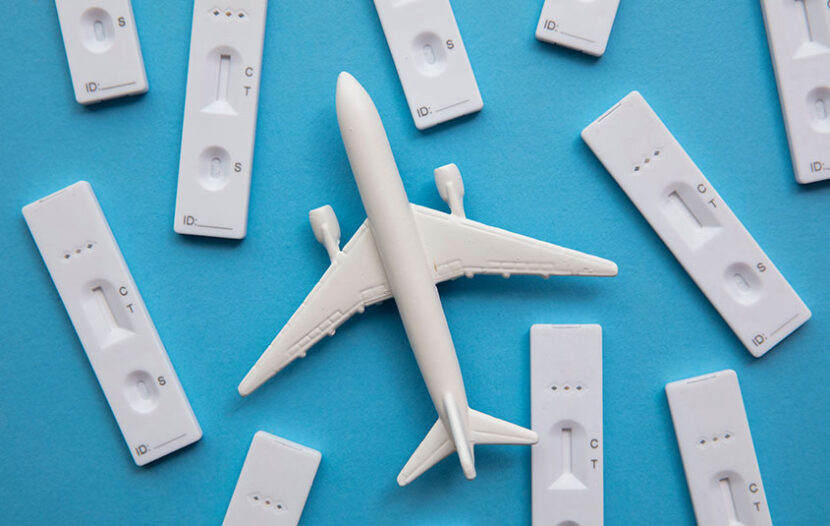OTTAWA — Just as airport delays and congestion were finally starting to improve slightly, comes word that the federal government will bring back mandatory random COVID-19 testing for travellers entering or returning to Canada.
The move takes effect July 19, 2022.
Given the long list of restrictions the travel industry has faced in getting travel back on track of the past 2+ years, the return of random testing is relatively minor.
However for many travellers it will be one more reason to defer travel plans, in the crucial summer months that many hoped would mark the start of the return to normalcy.
In these months of airport chaos, random testing has been one of the factors blamed for the delays for travellers coming into or returning to Canada. In the weeks leading up to the June 11 pause, both the GTAA and the Canadian Travel & Tourism Roundtable called for an end to mandatory random testing.
The return of mandatory random testing could also have many travellers wondering if more restrictions will be reinstated in the months to come, and second-guessing their future travel plans.
Both scenarios are frustrating and worrisome for an industry that has been to hell and back these past couple of years.
OFF-SITE TESTING
The federal government first announced the suspension of mandatory random testing on June 10. Transport Minister Omar Alghabra and Health Minister Jean-Yves Duclos made a point of stressing that any of Canada’s COVID-19 health measures could come back at any time: “Testing was and remains an important part of our surveillance program to track the importation of COVID-19 virus into Canada and identify new variants of concern.”
Now as caseloads start to creep up across the country in the midst of a seventh wave, the government announced this morning that mandatory random testing will resume as of July 19, for travellers who qualify as fully vaccinated, arriving in Canada by air to the four major Canadian airports – Vancouver, Calgary, Montreal and Toronto.
Just like unvaccinated travellers undergoing COVID-19 testing upon arrival, fully vaccinated travellers selected for random testing will be tested off-site.
“All testing for air travellers, for both those who qualify as fully vaccinated and partially or unvaccinated people, will be completed outside of airports, either via an in-person appointment at select testing provider locations and pharmacies, or a virtual appointment for a self-swab test. Travellers who do not qualify as fully vaccinated, unless exempt, must continue to test on Day 1 and Day 8 of their mandatory 14-day quarantine,” says today’s statement from the federal government.
“Moving testing outside of airports will support testing for travellers arriving by air while still being able to monitor and quickly respond to new variants of concern, or changes to the epidemiological situation. Mandatory random testing continues at land border points of entry, with no changes.”
The government says that air travellers who qualify as fully vaccinated and who are selected for mandatory random testing, as well as air travellers who do not qualify as fully vaccinated, will receive an email notification within 15 minutes of completing their customs declaration. The email will contain information to help them arrange for their test with a testing provider in their region.
Unvaccinated travellers can complete their tests by a virtual appointment or an in-person appointment with the test provider at their store or at select pharmacies and still respect their quarantine requirements.
All travellers must continue to use ArriveCAN (free mobile app or website) to provide mandatory travel information within 72 hours before their arrival in Canada, and/or before boarding a cruise ship destined for Canada, with few exceptions. The government says additional efforts are being undertaken to enhance compliance with ArriveCAN, which it notes is already more than 95% for travellers arriving by land and air combined.
All vaccinated travellers who are randomly selected for the border testing surveillance program must complete arrival mandatory testing requirements.
If your arrival test result is positive, you must go into isolation and follow the federal requirement to isolate for 10 days from the date of the test result. Your 10-day isolation is required, even if the isolation requirement is shorter in your province or territory.
Minister Duclos said Canada needs to keep border testing measures in place “because that is how we track importation of the COVID-19 virus, and of new variants of concern. We will keep adapting our border measures to balance the need to protect Canadians while supporting our economic recovery.”
And Minister Alghabra added: “As demand for travel increases across the world, today’s announcement marks an important step in our progress to streamline testing processes outside our airports while preventing the further spread of COVID-19. The Government of Canada will continue to protect travellers and employees and ensure our transportation system is safe, reliable, and resilient for the long term.”

